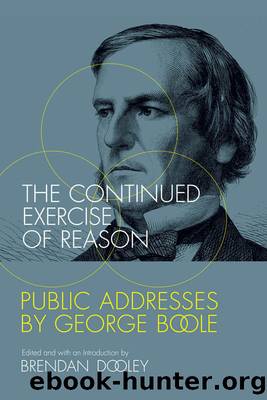The Continued Exercise of Reason by Brendan Dooley

Author:Brendan Dooley [Dooley, Brendan]
Language: eng
Format: epub
Tags: George Boole; switching circuits; Victorian England; Victorian Britain; George Peacock; Leibniz; Aristotle; Isaac Newton; gravity; Descartes; John Wallis; Johannes Kepler; optics; Edward Gibbon; Antoine-Yves Goguet; Jacob Bryant; British Museum; August Tholuck; cults; extraterrestrial; Georges Cuvier; John Pringle Nichol; banned books; John Stuart Mill; experiential learning; Rousseau; Friedrich Froebel; Thomas Chalmers; knowledge; Georges Cuvier; Robert Kane; humanities; symbolic logic; mathematical logic
ISBN: 9780262535007
Publisher: MIT Press
Published: 2108-04-20T00:00:00+00:00
Notes
1.âFrom the manuscript in University College Cork, Boole Library, Special Collections, BP/1/270â1.
2.âThe Cuthites lived in 6th century BC Samaria, and the Pelasgians inhabited the Aegean area before the Greeks.
3.âCompare Jacob Bryant, A New System or an Analysis of Ancient Mythology (London: J. Walker, 1807), 1:276ff.; Herodotus, Histories, 1:131.
4.âCompare Plutarch, Isis and Osiris, in Moralia, vol. 5, trans. Frank Cole Babbitt (Cambridge, MA: Harvard University Press, 1936), sec. 46 (369E): â[Zoroaster] called the one Oromazes and the other Areimanius; and he further declared that among all the things perceptible to the senses, Oromazes may best be compared to light, and Areimanius, conversely, to darkness and ignorance, and midway between the two is Mithras: for this reason the Persians give to Mithras the name of âMediator.ââ
5.âHerodotus, Histories, 1:131. The quote is rather liberally excerpted from the translation by William Beloe, originally published in 4 volumes (London: Leigh and Sotheby, 1791), 1:104. Newton referenced the same passage in The Chronology of Ancient Kingdoms Amended (London: J. Tonson, J. Osborn, and T. Longman, 1728), chap. 2, 220.
6.âAs Bryant (A New System, 1:94) commented, âHow little we know of Druidical worship, either in respect to its essence or its origin.â Yet Vincenzo Belliniâs Druidical opera Norma, with a libretto by Felice Romani, in turn partly based on Vicomte Chateaubriandâs novel Les martyrs (1809), was a hit in London in 1833.
7.âAll from Plutarch, Isis and Osiris, sec. 47 (370A).
8.âThe ichneumon is an Egyptian mongoose, and in mythology, the animal into which Ra metamorphoses in order to fight the evil god-snake Apopis.
9.âThe word âthatâ in this verse was âwhoâ in the original poem by John Milton, Paradise Lost (1: 477) in vol. 1 of Poetical Works of John Milton, ed. Helen Darbishire (Oxford: Clarendon Press, 1963), 17.
10.âThe four next lines are omitted.
11.âDiodorus Siculus, Library of History, trans. C. H. Oldfather (Cambridge, MA: Harvard University Press, 1933), 1:11.
12.âIbid., 1:14.
13.âDiodorus Siculus, Library of History, 5:4.
14.âBryant, A New System, 3:182.
15.âGenesis 8:20 and 9:20, respectively.
16.âPlutarch, Isis and Osiris, sec. 21 (359Câ359E).
17.âHere at âallotted to the priests,â UCC, MS BP/1/270 breaks off, and MS BP/1/271 begins.
18.âOn the parallelism between Hinduism and New World religions, see John Delafield, An Inquiry into the Origin of the Antiquities of America: With an Appendix Containing Notes and âA View of the Causes of the Superiority of the Men of the Northern over Those of the Southern Hemisphereâ by James Lakey (London: Longman, Rees, Orme, Brown, Green, and Longman, 1839), especially 31, citing a Reesâs Cyclopedia article suggesting that âthe Peruvian worship was that of Vishnu, when he appeared under the form of Chrishna, or the sun: whilst the sanguinary worship of the Mexicans is analogous to that of Siva, when he takes the character of the Stygian Jupiter.â On cannibalism, see Bryant, A New System, 6:311.
19.âWilliam Stukeley, Stonehenge, a Temple Restorâd to the British Druids (London: W. Innys and R. Manby, 1740); Richard Colt Hoare, The History of Ancient Wiltshire, 2 vols. (London: William Miller, 1810â1821); John Bathurst Deane, The Worship of the Serpent (London: Gilbert and Rivington, 1833).
Download
This site does not store any files on its server. We only index and link to content provided by other sites. Please contact the content providers to delete copyright contents if any and email us, we'll remove relevant links or contents immediately.
The remains of the day by Kazuo Ishiguro(8965)
Tools of Titans by Timothy Ferriss(8360)
Giovanni's Room by James Baldwin(7315)
The Black Swan by Nassim Nicholas Taleb(7097)
Inner Engineering: A Yogi's Guide to Joy by Sadhguru(6783)
The Way of Zen by Alan W. Watts(6590)
Asking the Right Questions: A Guide to Critical Thinking by M. Neil Browne & Stuart M. Keeley(5751)
The Power of Now: A Guide to Spiritual Enlightenment by Eckhart Tolle(5742)
The Six Wives Of Henry VIII (WOMEN IN HISTORY) by Fraser Antonia(5493)
Astrophysics for People in a Hurry by Neil DeGrasse Tyson(5172)
Housekeeping by Marilynne Robinson(4433)
12 Rules for Life by Jordan B. Peterson(4298)
Double Down (Diary of a Wimpy Kid Book 11) by Jeff Kinney(4257)
The Ethical Slut by Janet W. Hardy(4236)
Skin in the Game by Nassim Nicholas Taleb(4232)
Ikigai by Héctor García & Francesc Miralles(4229)
The Art of Happiness by The Dalai Lama(4120)
Skin in the Game: Hidden Asymmetries in Daily Life by Nassim Nicholas Taleb(3986)
Walking by Henry David Thoreau(3949)
